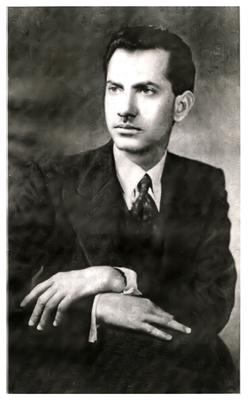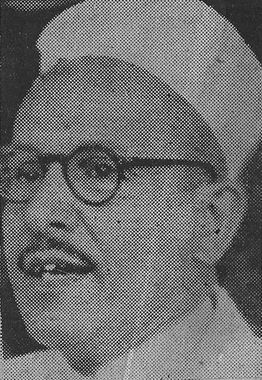Related Research Articles

Indian Union Muslim League is a political party primarily based in Kerala. It is recognised as a State Party in Kerala by the Election Commission of India.

Tirunelveli, also known as Nellai and historically as Tinnevelly, is a major city in the Indian state of Tamil Nadu. It is the administrative headquarters of the Tirunelveli District. It is the fourth-largest municipal corporation in the state after Chennai, Coimbatore, and Madurai. Tirunelveli is located 624 km (388 mi) southwest of the state capital Chennai, 58 km (36 mi) away from Thoothukudi, and 73 km (45 mi) from Kanyakumari. The downtown is located on the west bank of the Thamirabarani River; its twin Palayamkottai is on the east bank. Palayamkottai is called the Oxford of South India as it has many schools and colleges. It has several important government offices.

The Constituent Assembly of India was elected to frame the Constitution of India. It was elected by the Provincial assemblies of British India following the Provincial Assembly elections held in 1946. After India's independence from the British in August 1947, its members served as the nation's 'Provisional Parliament', as well as the Constituent Assembly. It was conceived and created by V. K. Krishna Menon, who first outlined its necessity in 1933 and enshrined it as an Indian National Congress demand.

Tamil Muslims are Tamils who practise Islam. The community is 6 million in India, primarily in the state of Tamil Nadu where 90% of the Muslim community identified themselves as Tamils. In Tamil Nadu, the majority of Tamil-speaking Muslims belong to the Rowthers Community while other Muslims live in coastal Tamil Nadu. There is a substantial diaspora, particularly in Southeast Asia, which has seen their presence as early as the 13th century. In the late 20th century, the diaspora expanded to Western Europe, Persian Gulf and North America. These Tamil speaking Muslim communities in Sri Lanka were known as the Sonakar, which is derived from the term Yona, originally meaning a Moors.

SirZiauddin Ahmad was an Indian mathematician, parliamentarian, logician, natural philosopher, politician, political theorist, educationist and a scholar. He was a member of the Aligarh Movement and was a professor, principal of MAO College, first pro vice-chancellor, vice chancellor and rector of Aligarh Muslim University, India.

Nawab Mohammad Ismail Khan was an eminent Muslim politician and a leading activist of the All-India Muslim League, who stood in the forefront of the Khilafat Movement and Pakistan Movement. Nawab Mohammad Ismail Khan is regarded as one of the founding fathers of the Islamic Republic of Pakistan due to the roles that he fulfilled for the cause of it. His position was described as only second to that of Muhammad Ali Jinnah.
The anti-Hindi-imposition agitations in Tamil Nadu have been ongoing intermittently in the southern Indian state of Tamil Nadu since the early 20th century. The agitations involve several mass protests, riots, student and political movements in Tamil Nadu concerning the official status of Hindi in the state.

Sardar Muhammad Ibrahim Khan was a Kashmiri revolutionary leader and politician, who led the 1947 Poonch Rebellion against absolute rule of the Maharaja in the state of Jammu and Kashmir and played a key role in the First Kashmir War, supporting Pakistan. He served as the President of Azad Kashmir for 13 years across four non-consecutive terms and still remains the longest-serving president of the state, since its establishment.

Begum Qudsia Aijaz Rasul was the only Muslim woman in the Constituent Assembly of India that drafted the Constitution of India.
Aladi Aruna (alias) V Arunachalam was an Indian politician. He was the Law Minister of Tamil Nadu. He was elected to the Tamil Nadu legislative assembly as a member of the Dravida Munnetra Kazhagam from Alangulam constituency in the 1967, 1971 and 1996 elections. He was elected to the Lok Sabha, the lower house of India's Parliament, from Tirunelveli constituency in the 1977 elections. He was also a member of the Rajya Sabha, the upper house of India's Parliament, as a member of the Anna Dravida Munnetra Kazhagam. He came into the limelight when he issued a dissent note in the JPC report on the Bofors Scandal against a clean chit to Rajiv Gandhi government. He was assassinated in 2004.

Mohammed Abdur Rahiman Sahib was an Indian freedom fighter, Muslim leader, scholar, and politician from Kerala. He served as president of Kerala Pradesh Congress Committee(Malabar) in 1939.

M. Muhammad Ismail Rowther Sahib was an Indian politician and social worker from southern Indian state Tamil Nadu. he was a founder of the Indian Union Muslim League party after the partition of British India. He was popularly known in Tamil Nadu and Kerala as the "Quaid-e-Millat". Ismail was a member of Madras Legislative Assembly and Leader of the Opposition (1946—52). He was also a member (1948—50) of the Constituent Assembly, the drafting body of the constitution of India. He was also a member of Rajya Sabha (1952—58) and Lok Sabha.

K. M. Seethi Sahib (1899—1961), born K. M. Seethi, was an Indian politician and community leader from Kerala. He served as the Speaker of Kerala Assembly during 1960-61.
Melapalayam is a neighborhood of Tirunelveli City in Tamil Nadu, India situated on the east bank of the Thamirabarani River. The neighborhood's name comes from its location west of Palayamkottai. Eighty percent of the population is Muslim.

B. Pocker, Badekkandy, also spelled Poker, title Sahib Bahadur, as an Indian politician and lawyer from Tellicherry, north Kerala, Madras Presidency. He served as a member of the Constituent Assembly of India and as the Member of Parliament from Malappuram Parliamentary Constituency between 1952 and 1962.
S. M. Muhammed Sheriff Sahib (1924-1981), affectionately known as 'Madurai Sheriff Sahib', was a distinguished Indian politician, professor and lawyer. He emerged as a prominent figure in Tamil Nadu politics, leaving an indelible mark on India's parliamentary history. Sheriff Sahib was mentored by Quaid-e-Millath Muhammad Ismail Sahib and rose to prominence as the first elected Indian Union Muslim League Member of Parliament from Tamil Nadu after India's independence. He represented the historic Ramanathapuram and Periyakulam Constituencies, where he played pivotal roles in various parliamentary committees.

Abdul Matin Chaudhury, also known by his daak naam Kola Mia ; and the epithet Jinnar Daain Haat ; was a Pakistani Bengali trade unionist, journalist, politician, and a member of the Pakistan Constituent Assembly as a representative of East Bengal.

K. Uppi Saheb, or Kottal Uppi Saheb Bahadur, (1891–1972) was an Indian politician and social worker from Kannur, north Kerala.
References
- 1 2 Wright, Theodore P. (September 1966). "The Muslim League in South India since Independence: A Study in Minority Group Political Strategies". American Political Science Review. 60 (3): 579–599. doi:10.2307/1952972. ISSN 0003-0554. JSTOR 1952972. S2CID 143572105.
- ↑ "Constitution of India". www.constitutionofindia.net. Retrieved 26 January 2023.
- ↑ "Eparlib" (PDF). Constituent Assembly Debates.
- ↑ "Freedom First Magazine | The monthly journal of the Indian Committee for Cultural Freedom". www.freedomfirst.in. Retrieved 26 January 2023.
- ↑ "Constituent Assembly of India: Debates". loksabha.nic.in. Retrieved 26 January 2023.
- ↑ "Debates in the Constituent Assembly and thereafter on UniformCivil Code" (PDF). Indian Policy Foundation. 13 November 2020.